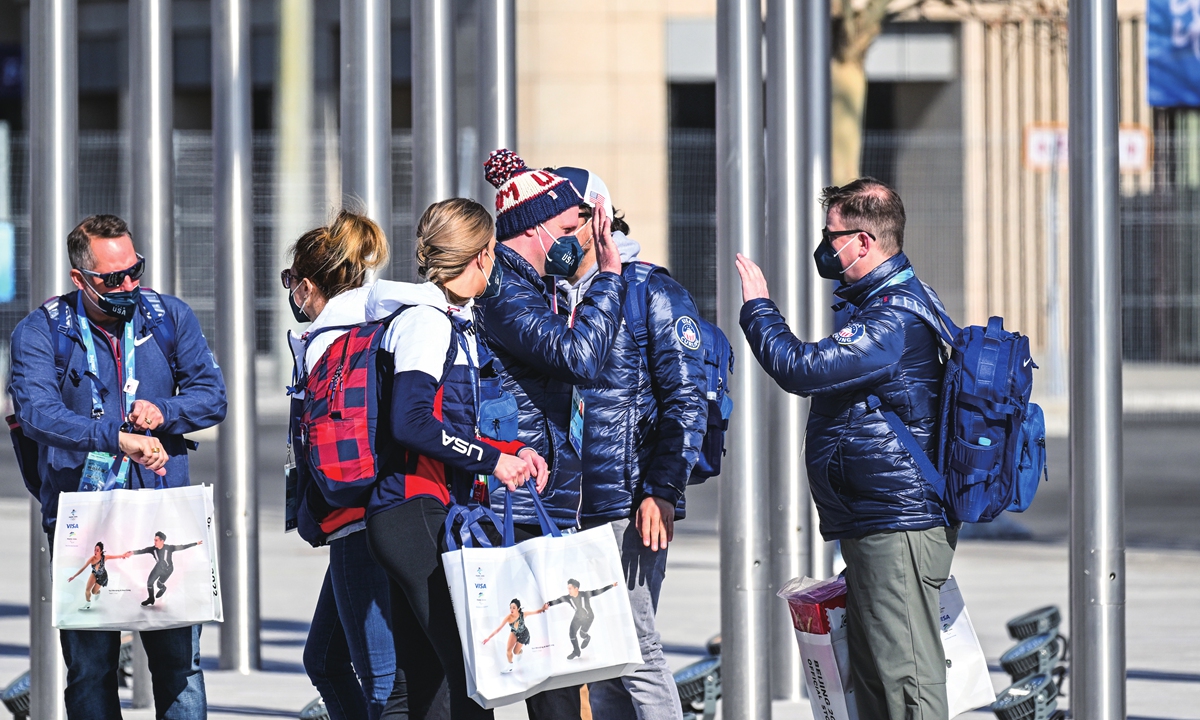Peking University, February 21, 2022: A total of 437 participants of the Beijing 2022 Winter Olympic Games tested positive starting from January 23, when the Olympic Village welcomed the first batch of athletes and other relevant personnel, said an official of the organizing committee of the Beijing Games on Sunday.
Members of the US delegation greet each other at the Winter Olympics village in Beijing, January 29, 2022. Photo: cnsphoto
The official noted that the vast majority of those did not need medical treatment and recovered smoothly as they were asymptomatic or mildly infected, and thus could be healed by themselves during quarantine or hospitalization.
Positive patients with severe illness or symptoms would get priority for symptomatic treatment, said Huang Chun, deputy director of the epidemic prevention and control office of the organizing committee at Sunday's press conference.
The medical staff would take the patient's specific situation into account, with full information and consent, and use appropriate medicines or other methods for treatment.
People with no symptoms or mild symptoms will recover without treatment during quarantine or hospitalization, so no special treatment is generally required, Huang explained.
The most distinctive feature involving the Games is that the event was held successfully against the backdrop of the Omicron strain spreading around the world, and the foundation of the successful Games lies in effectively controlling the spread of the epidemic and ensuring the safety of the event, Han Zirong, a vice president and secretary general of the Beijing Organizing Committee, said at the press conference.
All the measures highlighted the concept of taking the event as the core and the athletes as the center, and through the joint cooperation of all stakeholders, all the epidemic prevention measures were effectively implemented, making the closed loop of the Winter Olympics "one of the safest places in the world," Han stressed.
The closed loop was hailed by Japanese reporters as a "protective bubble" in the true sense, while outside the loop Beijing had no new COVID-19 cases for 13 consecutive days during the Games.
Japan's Jiji News Agency reported on January 30 that the "anti-epidemic bubble" in Tokyo was one with loopholes, as people coming from overseas were allowed to go out once finishing quarantine, while in Beijing the "bubble" was more like "an invisible wall."
The COVID-19 policies adopted by the Olympics mirror China's dynamic zero-COVID policy, and prove that such a policy can be used flexibly under complicated circumstances like the Olympics, Wang Guangfa, a respiratory expert at Peking University First Hospital, told the Global Times.
Mass vaccination, remote epidemic prevention and control management, strict closed-loop management, daily nucleic acid testing, and a series of adjustment measures during the Games formed a very strict defense against the epidemic, which would provide useful reference for future world-class major sports events and cultural events, Han Zirong said.
